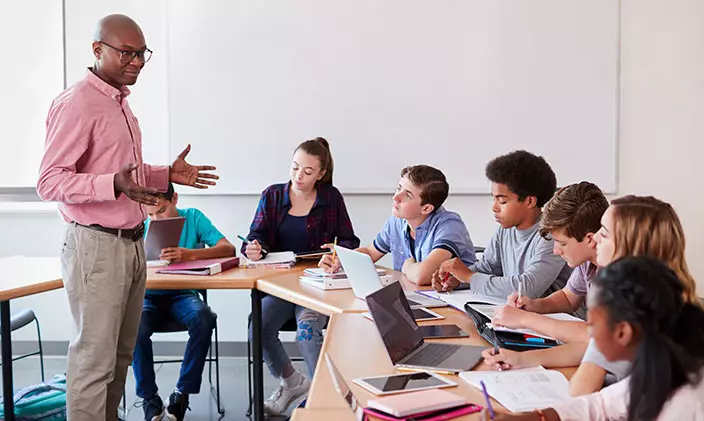The Application of Practical Experience to Achieving Student Learning Goals: Does it Really Help?

By David Aiken
The context
One of the early and most important differentiators of the University of Phoenix approach to education has been its use of Practitioner Faculty – faculty who are working professionals who teach in addition to their engagement in the professional area related to their courses. Staying current in their profession enables faculty to relate course content and the learning objectives or skills learned in the courses directly to real-world examples where these objectives or skills are applied. Faculty may make the connection between course content and real-world problem solving through the weekly discussions in the classroom or through the feedback they provide students on assessments.
Educators contend that the more faculty share examples of how the concepts and skills addressed in class may show up in a work setting, the better students may be able to take these new learnings and skills and apply them in their own work settings or lives. The assumption that Practitioner Faculty share their professional experiences in the classroom and that students benefit from this teaching method has been insufficiently tested (Vaidya et al., 2021).
Our Study at the Center for Educational and Instructional Technology Research (CEITR)
Our research team at the Center for Educational and Instructional Technology Research (CEITR) recently investigated the extent of the relationship between the student’s perception relating to faculty connecting course content to student’s real-world experience.
The study used a survey to ask faculty in a defined set of courses in the College of Business and IT about the ways in which they connect course content to real-world scenarios and the degree to which they share examples from their own professional experiences. The research team took these results and explored whether there is a relationship between the faculty responses and student responses to two questions addressing career-relevance on the Student-End-of-Course-Survey (SEOCS).
The Results and Implications
This study found that though business school faculty indicated they shared personal experiences with students, and though students surveyed concurred that these experiences have been shared, students do not feel these experiences enhance their learning or could be applied in their personal careers. These findings elicit additional questions by the researchers, such as “What experiences are being shared?”, “Are these experiences relevant to the coursework?”, “Are the experiences timely and current?”, and “Are the experiences being delivered in a way that the students can receive them effectively?”. Kyrousi (2022) explored the generational gaps between faculty (Baby Boomers and Millennials) and students (older Millennials, Gen Y and now Gen X). Consumption of knowledge in younger generations is less from reading and lectures and more from short videos, blogs, and social media posts. This difference between delivery and receiving methods of information may be contributing toward this disconnect.
A study that includes and examines the effectiveness of multiple delivery methods for faculty to share practical, real-life experiences over a larger sample size of faculty and students would be a logical next step to determine the most effective methods. If future educators are to be successful and maximize the benefit of students taking a course for their careers, these methods need to be better understood and optimized. Enhancing faculty and student interaction with respect to real-life experiences can improve student learning outcomes and enhance employment opportunities, as employers expect graduating adult learners to have acquired skills applicable to today’s workplace. Communication methods between faculty and students may need to be better aligned, and this should be explored. Given there continues to be a mismatch between job seekers and skills required by employers for open jobs (Gabrielova & Buchko, 2021), a better alignment of communication between faculty and students to enhance their employability would also benefit employers.
References
University of Phoenix Philosophy. (2023). University of Phoenix.
Gabrielova, K. & Buchko, A. (2021). Here comes Generation Z: Millennials as managers. Business Horizons, 64(2). https://doi.org/10.1016/j.bushor.2021.02.013
Kyrousi, A. G., Tzoumaka, E., & Leivadi, S. (2022). Business employability for late millennials: Exploring the perceptions of generation Z students and generation X faculty. Management Research Review, 45(5), 664–683. https://doi.org/10.1108/MRR-04-2021-0328
Vaidya, R., Prasad, K., & Mangipudi, M. (2021). An empirical study of academic staff performance with and without industry work experience and their effectiveness in teaching, learning and research in the faculty of business administration: A comparative analysis concerning Indian universities. Turkish Online Journal of Qualitative Inquiry, 12(4), 1029 -1041.

Dr. David Aiken
ABOUT THE AUTHOR
Dr. David (Dave) Aiken has been with the University of Phoenix College of Business and Information Technology since 2003 in Associate and Lead Faculty, Subject Matter Expert, and Faculty Assessment positions in both online and on campus modalities. Dave has extensive industry experience in Electronics Design and Information Technology and specializes in helping multinational organizations with their communication and collaboration challenges. Dave has a doctorate in International Business from Walden University, an MBA from Pepperdine University, and a BS in Electrical and Computer Engineering from The University of Rochester, NY.